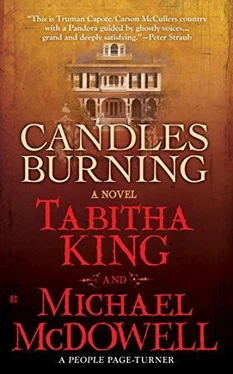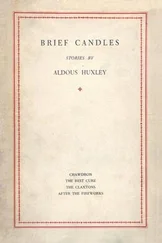I was allowed free use of the piano. Without a day’s lesson, I could and did play exactly what I heard. Mrs. Mank did not play the piano—people, money and information, interchangeably, were her instruments. She was incessantly on the phone, and heaps of discarded newpapers marked every place she sat.
Piano playing was not my only occupation. I immersed myself in a stack of books that constituted the summer reading list for my new school, the name and location of which I was not given. I amused myself by carefully not asking Mrs. Mank for that information. I did not intend to ever attend that school.
And I listened. Mrs. Mank knew that I was listening. She had brought me into her house, knowing that I would. Perhaps that is why she made so little effort to keep most of her secrets from me. For the time being, I chose not to remark upon what I heard. I waited. And listened.
By the end of the first week of our arrival in Brookline, I was still bald under the wig but stubble was emerging on my scalp. I wasn’t sure but I thought it was the sand-color of my hair before Santa Rosa Island. When I reported this to Mrs. Mank, she was again unperturbed.
“How would you explain such a phenomenon?” she asked me.
I had been thinking about it long enough. “Miz Verlow’s shampoo that she made for me.”
Mrs. Mank smiled her secretive smile.
“I have made an appointment for you with a gynecologist, my dear. You will need a reliable method of birth control now.”
Ah. Miz Verlow’s vitamins. Thanks for letting me know, Miz Verlow. It might have saved Grady and me a few days of wretched anxiety. No wonder Merry Verlow had looked just a wee shamefaced when I last saw her.
My large and growing feet made shopping for shoes the most daunting task of all. One day in the second week of August, Mrs. Mank took me back to the shop where she had ordered specially fitted shoes for me. As I waited for her to pay for the shoes, a transistor radio babbled softly in the back of the shop. A change in the cadence of speech clued me in at once that a newscast was on but then the place names shouted at me: Gulf of Mexico! Hurricane! Gulf Coast! Florida Panhandle!
“There’s a hurricane off the Gulf Coast,” I told Mrs. Mank.
“Oh my,” she said mildly.
The Benz sedan in which Appleyard had driven us occupied a parking slot a few spaces from the shop. Appleyard waited on the sidewalk to relieve us of the shopping bags as we reached the sedan. While Mrs. Mank and I folded ourselves into the backseat of the Benz, Appleyard whipped the bags into the trunk, closed it, and was there to close the door of the sedan after me.
When he was behind the wheel, Mrs. Mank asked him to turn on the radio and tune it to a station that would report on the weather. We were in Brookline and entering the drive to Mrs. Mank’s house before we heard another report on the approaching hurricane. Appleyard turned up the volume and we sat in the sedan in the driveway, in the air-conditioning, while the radio told us that a hurricane named Camille was churning over the Gulf toward the coast of Mississippi. She was expected to turn toward Florida’s Panhandle in the next twenty-four hours. All hurricanes are dangerous but Camille, according to this report, was extraordinarily powerful.
Mrs. Mank attempted in vain to reach Miz Verlow. Rising winds preceding the hurricane had already taken down the line and cut off Merrymeeting on Santa Rosa Island.
Camille’s threat raised a storm of guilt in me at leaving without saying good-bye to Perdita and Cleonie and Roger and Grady. I did miss them. Still, I had not sent so much as a postcard, let alone written a letter. Every night I went to bed thinking that in the morning, I would leave, go back to Santa Rosa Island, collect my money, and find myself a school of my own choice. Every morning, I woke with the thought that it was the day that I should confront Mrs. Mank and demand the secret that I was promised, and then I would leave, at once. In her presence, though, I felt a certain amount of fear, enough to keep me hesitant. I told myself that I was playing a long game, and everything that I learned while I waited was worth the while. And damn, I was going to have a lot to tell Grady about living the life of the wealthy.
Writing after the hurricane would be pointless. No one on Santa Rosa Island would be getting any mail for a while. I lost myself in reading. When eyestrain blurred the words and headache locked up all sense, I prowled the house, trying to interest myself in Mrs. Mank’s LPs or the books shelved in nearly every room. Mama was supposed to meet Ford in Mobile on the seventeenth. I hoped that the deterioration of the weather ahead of the hurricane had not trapped her on Santa Rosa Island, preventing her from the reunion she had so desired.
Camille never made the predicted swerve toward Santa Rosa Island and Pensacola. She struck the coast of Mississippi head on, over the seventeenth and eighteenth of August. Camille savaged Mobile, but it was Pass Christian she hurt the worst.
It was Pass Christian and not Mobile where Mama’s body was found, floating tits up in a hotel pool. The hotel the pool once graced was gone.
MAMA was not missing for long. Floating around in that swimming pool in the middle of the cement slabs on which a hotel stood two days previous, like a bug in a puddle in the middle of a cemetery, she would have been hard to miss.
Miz Verlow was able to contact us via marine radio on the nineteenth, so I knew that Mama had gone to Mobile. She had hired Roger to drive her in the Edsel. Why that old clunker? I wondered if she had thought that it might in some obscure way please Ford.
Finding Roger took longer because he was taken sick with pneumonia in a shelter set up in a little colored church in Mobile. He had no memory of how he had gotten there or what had happened to the Edsel or Mama. The last he remembered was he and Mama smoking cigarettes inside the Edsel, parked on the broken pavement that was all there was left of the Ford automobile agency once owned by Daddy, and debating whether they should find a hurricane shelter. Mama had wanted to wait for Ford who surely, she insisted, had promised to be there. The Edsel rocked from side to side in the blasts of wind, scaring the both of them, but when Roger decided that he was getting the hell out of there and started the Edsel again, he could see nothing outside. The Edsel began to roll seemingly on its own, with Mama shrieking in the back. Roger clung to the wheel. The elements became so indistinguishable, a freight-train vortex of wind and rain, that Roger thought he might for a while have actually flown the Edsel in it.
After the hurricane, the broken pavement was gone, replaced with the roof of a Chinese restaurant. The Edsel turned up driven halfway into the hull of a fishing trawler named Katie sitting athwart East Beach Boulevard, also known as Route 90. Dorothy and Toto were nowhere to be seen.
Mrs. Mank relayed the news from Merry Verlow to me, in the garden of the house in Brookline, just outside of Mrs. Mank’s ground-floor sitting room. I had heard the phone ring and Merry Verlow’s voice over the phone from where I was, stretched out on a comfortable chaise with a book in one hand. Mrs. Mank hung up and came to the French doors that opened from her sitting room into the garden.
“You know,” she said.
I nodded numbly.
“Have you heard anything?”
From Mama, she meant. I shook my head no. I was not lying. She knew that I had been listening since we heard of Mama’s disappearance. I had been listening for Roger too.
My brother, Ford, or someone so identifying himself, claimed Mama’s corpse. None of the officials Miz Verlow queried had any idea where Ford had taken Mama’s remains but she was told that he had made mention of cremation. Where and when the cremation occurred or if any sort of funeral had been held, or burial of an urn or scattering of ashes done, she was unable to learn. Colonel Beddoes’s desolation deepened when he learned that he was not going to get back Mama’s ring, for it was not recovered. Either the hurricane had taken it, or some other thief.
Читать дальше












